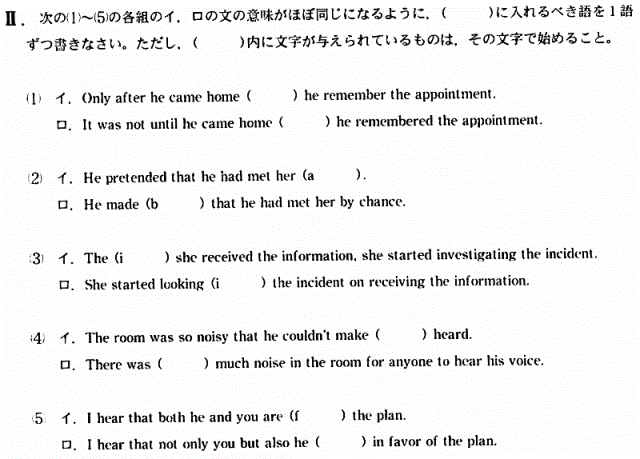東京慈恵会医科大学医学部過去問研究
こんにちは。医学部受験英語指導プロ家庭教師の宮部です。
今年2007年度も例年通りの問題構成でした。
内容は Ⅰ 発音 Ⅱ 同意文(適語補充) Ⅲ 会話文(適語補充) Ⅳ 長文総合 Ⅴ 和文英訳でした。
難易度も例年通り、とはいえ医大医学部難関校の出題内容です。語彙・構文・idiomともに難度の高いものばかりです。
合格ライン80%を超えるには、Ⅰ~Ⅲの定番の設問で取りこぼしをしないようにしましょう。
今回はⅡ 適語補充について解説します。
東京慈恵会医科大学医学部2007年度英語入試問題Ⅱ適語補充 問題
東京慈恵会医科大学医学部2007年度英語入試問題Ⅱ適語補充解答・解説
| イ. Only after he came home ( ) he remember the appointment. | | ロ. It was not until he came home ( ) he remembered the appointment. | | 解説 | | イ: Only after「~して初めて」 | | 準否定語を含む語句が文頭に置かれる場合倒置がおこるので he remembered the appointment.を倒置文にすると | | did he remember the appointment. | | ロ:untilは否定語とともに用いて …するまで(…しない), …して初めて(…する) | | It was not until ~ that ・・・・.~して初めて・・・・した。 | | It was not until he came home he remembered the appointment. 家に帰って初めて彼は約束を 思い出した。 | | 解答 | | イ. ( did ) ロ. ( that ) |
|
|
(2)解答・解説
| イ. He pretended that he had met her (a- ). | | ロ. He made (b-) that he had met her by chance. | | 解説 | | イ. (a- )には ロ の by chance「たまたま,偶然に」の同意語(副詞)が入る。 | ロ. make (b- )には イ の pretend「…を装う, …のように見せかける, …のふりをする」 の同意語が入る。
make believe「〈…と〉見せかける, ふりをする 」 | | | | 解答 | | イ. ( accidentally ) ロ. ( believe ) |
|
|
(3)解答・解説
イ. The (i- ) she received the information, she started investigating the incident.
| | ロ. She started looking (i-) the incident on receiving the information. | | | | 解説 | | イ. the instant ~「~した[する]瞬間に,…するやいなや」 | | ロ.on +動作名刺(動名詞) ~するとすぐ,~と同時に | | investigate 「〈…を〉調査する 捜査する」 = look into | | 解答 | | イ. ( instant ) ロ. ( into ) |
|
|
(4)解答・解説
| イ. The room was so noisy that he couldn’t make ( ) heard | | ロ. There was ( ) much noise in the room for anyone to hear is voice. | | 解説 | | イ. make oneself heard | | 「(1) 騒音のため大声を出して自分の声が聞こえるようにする。 | | (2) 自分の意見(言い分)を聞いてもらう。ここでは(2) 部屋がうるさいので彼は自分の意見を聞いてもらえなかった。 | | so~that S +can not・・・ = too~for + 目的格+to-不定詞 「あまりに~なので Sは・・・できない」 | | 解答 | | イ. ( himself ) ロ. ( too ) |
|
|
(5)解答・解説
| イ. I hear the both he and you are (f- ) the plan. | | ロ. I hear that not only you but also he ( ) in favor of the plan. | | 解説 | | both A and B 【A・Bが主語の場合動詞は複数扱い】 | | not only A but also B 【A・Bが主語の場合動詞は Bに一致】 | | for:【賛成・支持・味方を表す】=in favor of | | イ.I hear the both he and you are for the plan.彼もあなたも2人ともその計画に賛成していると聞いているよ。 | | 用例: Are you for or against the bill? 「あなたはその法案に賛成か反対か」 | | 解答 | | イ. ( for ) ロ. ( is ) |
|
|
スペースONEプロ家庭教師の宮部です。
2007年度東京慈恵会医科大学医学部入試問題 英語[Ⅱ]はいかがでしたか。語彙力が勝負の分かれ目のような出題でしたね。

